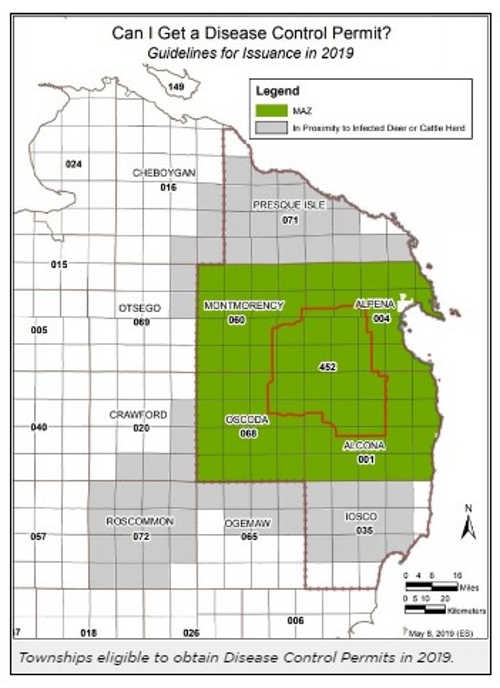By Christian Tollini
The latest discovery of bovine tuberculosis (TB) infections in northeast Michigan cattle herds is a cause for concern for Michigan’s entire cattle industry. It has not been uncommon to identify an infected herd annually within the four county Modified Accredited Zone (MAZ), which includes Alpena, Alcona, Oscoda and Montmorency counties. However, the two latest herds that tested TB positive were discovered in Presque Isle and Emmet counties, both of which are TB-free counties. How does this affect the cattle industry across the state?

This year, the
Michigan Department of Agriculture and Rural Development (MDARD) signed a new Memorandum of Agreement (MOA) with the
United States Department of Agriculture (USDA). In this new MOA, finding one or more positive cattle herds with bacteria from the Modified Accredited Zone deer strain in Michigan’s TB-free counties mandates that discussions with USDA be initiated to discuss different response activities including changing TB zoning and/or increasing cattle and deer surveillance.
Though the apparent prevalence of TB-infected deer in the Modified Accredited Zone is not high (between 2-3% in 2018), when these deer leave behind the bacteria on feed or forage that are consumed by cattle, infection of cattle can occur. Removing deer that have become acclimated to farms is a means to reduce the risk of cattle infection while still maintaining a wild whitetail deer population. In 2018, hunters harvested an estimated 19,359 deer in the Modified Accredited Zone, while only 552 deer were harvested by disease control permits comparatively.
Presently, MDARD and USDA are in the midst of negotiations to determine what the fate of Presque Isle County’s TB-free status will be and what new requirements cattle producers there will have to comply with. While this is disheartening news for livestock operations and another setback in the fight against eradicating this disease, it is important that communities in northeast Michigan come together to help protect both their agriculture and recreation industries.
One tool that is available, and underutilized, to help decrease the incidence of herd infections in northeast Michigan is the recent expansion in landowners’ accessibility to disease control permits. Beginning in 2019, as shown in the table below, any landowner in Presque Isle, Montmorency, Alpena, Oscoda and Alcona counties that has a cattle or bison operation on their land, as well as any landowner that has property joining a cattle or bison operation, is eligible to obtain an unlimited amount of disease control permits, at no cost, and they are valid 365 days a year. In the rest of the counties where biosecurity measures and TB testing of cattle are required (areas shaded gray in Figure 1), these permits are also available to any of those same landowners; however, the disease control permits in these areas are not valid during deer seasons in these counties.
Can I get a disease control permit?
| Alcona, Alpena, Montmorency and Oscoda counties | Remainder of state where MDARD biosecurity measures of TB testing of cattle are required |
|---|
Cattle or bison operation | *Plus Presque Isle County
Yes
(Valid Jan. 1 – Dec. 31) | Yes
(Not valid during deer hunting season) |
Adjacent to cattle or bison operation | *Plus Presque Isle County
Yes
(Valid Jan. 1 – Dec. 31) | Yes
(Not valid during deer hunting season) |
Other livestock and non-livestock agricultural operation (e.g., orchards, crop farms) | Yes
(Not valid during deer hunting season) | Eligibility determined by proximity to infected deer or cattle herd
(Not valid during deer hunting season) |
Non-agricultural | Eligibility determined by local biologist
(Not valid during deer hunting season) | Eligibility determined by proximity to infected deer or cattle herd
(Not valid during deer hunting season) |
Additionally, all other agricultural operations (crop farms, orchards, livestock other than cattle or bison, etc.), can obtain disease control permits at no cost that are valid year-round, excluding deer seasons. Other agricultural operations within the gray shaded area on Figure 1 can also obtain these disease control permits if considered eligible by proximity to infected deer or livestock herd. This also applies to non-agricultural landowners within the Modified Accredited Zone, as well as the remainder of the state where MDARD biosecurity and TB testing is required.
Click here to see more...